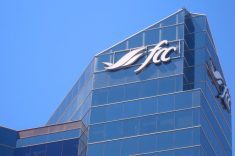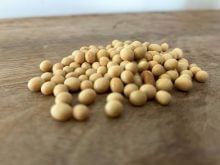(Reuters) — Louis Dreyfus Commodities B.V. reported flat earnings in the first half after a sharp drop last year, saying business fundamentals remained “strong” as it searches to replace its chief executive.
Louis Dreyfus, which competes with other big agricultural traders, including Archer Daniels Midland Co., Bunge Ltd. and Cargill, said net sales rose 16 percent to $33.7 billion in the six months to June 30, for net income of $260 million. It said shipped volumes rose six percent on the year.
Claude Ehlinger, the company’s interim chief executive officer and chief financial officer, said each of its divisions made solid contributions with its “merchandizing segment platforms seizing market opportunities, and the value chain segment benefiting from good processing margins and efficient assets.”
Read Also

Lending policy still focused on primary producers: FCC
Farm Credit Canada said it has not changed its business practices and remains committed to supporting all producers, after a report from an Ottawa-based media outlet claimed otherwise.
The firm said its oilseed, cotton and metals units performed well, while fertilizer and sugar lagged.
The 163-year-old Dreyfus is in transition as it seeks a new CEO after Ciro Echesortu quit unexpectedly after just a year, and as it steps up investments in a bid to keep growing in coveted commodity markets.
In 2013, Louis Dreyfus said its net income fell to $640 million from a record $970 million in 2012.
It has been a difficult couple years for many big trading houses, and this year’s slump in grain prices caused by bumper crops across the world has hit the so-called “ABCD” firms that dominate global grain trading.
Cargill reported a 12 percent drop in net earnings for the most recent quarter, although it pinned those losses more on bad U.S. energy market bets and a slumping Venezuelan currency.
Some firms have fared better. Trading house Gunvor last week reported a 12 percent rise in core earnings (EBITDA) in the first half of the year, although it warned that the trading environment would remain challenging over the rest of the year.
“Good market knowledge and enhanced geographical diversification allowed the group to benefit” in the context of abundant supplies, the company said in its release.
In the statement, Ehlinger also said “geopolitical turmoil and climatic uncertainties in specific regions partially affected fundamentals.”














